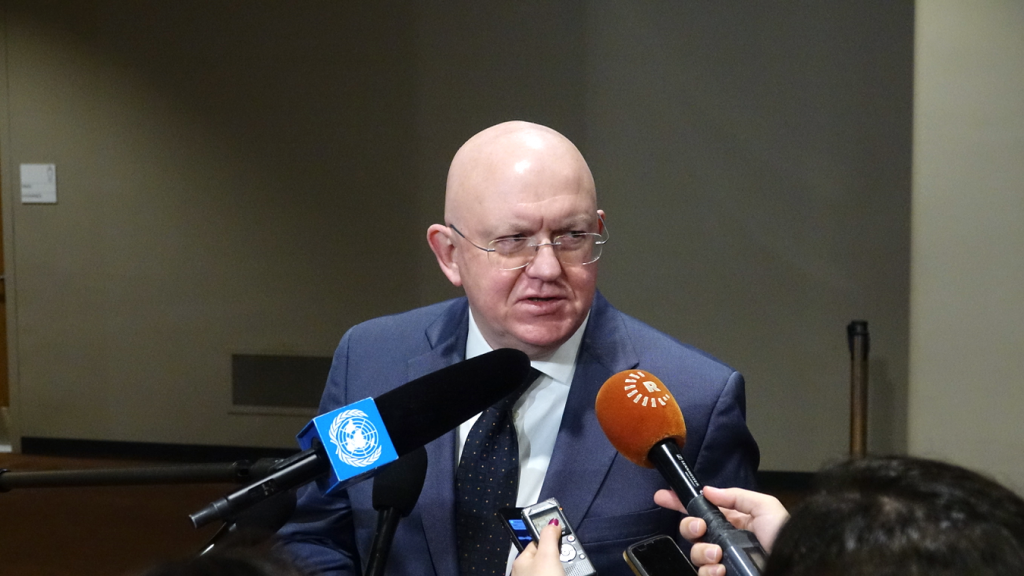Remarks by Ambassador Vassily A. Nebenzia, Permanent Representative of the Russian Federation to the United Nations, following UNSC meeting on threats to international peace and security
Q.: Today the Russian Defense Ministry said that there was no attack in Douma. Can you clarify, what do you think is happening?
A.: I cannot clarify on behalf of my Defense Ministry. They said it. But this information on the attack which we do not know anything about is very worrisome. We have footage, coverage of people speaking of how the accident was actually staged in the hospital. It was widely broadcast. We have other materials that we would be willing to provide to the general public to see as a proof of a fake that is used for very dangerous purposes.
Q.: Ambassador, yesterday you spoke about the concern of war, in particular about US and Russia. Is it possible that it still stands? Is there a military coordination, is the deconfliction agreement still working between US and Russia?
A.: Don’t misinterpret me. I was not beating the drums of war yesterday. I was just saying that the situation is so dangerous that we cannot exclude anything and, hopefully, the channels of communication are working, but not through me, so I cannot tell you how they are working. I hope that appropriate communication is going through appropriate channels.
Q.: How about diplomatic effort, the Swedish draft?
A.: There are diplomatic efforts that you witnessed today in the SC. The best thing I can do is to quote the Ambassador of Bolivia who said a key phrase. He said: “You cannot pretend to uphold international law by violating international law”. That’s exactly what we say.
Q.: What about Syria’s violation of the Chemical Weapons Convention?
A.: Prove it first then we will talk about it. Before anything was proved, they already designated culprits. There is no mission yet there. It has to confirm that any accident happened at all, provide some conclusions at least. But they don’t need any conclusions. They said Damascus is the culprit and it has to be punished.
Q.: Mr. Ambassador, in 1973 Russia, at that time Soviet Union, and the United States had a kind of similar confrontation in the Middle East. Very similar because nuclear became set after the Cuba Missile Crisis that is considered the most dangerous moment. Do you see any similarities because at that time President Nixon was very close to impeachment? Do you see any similarities of the situation? Your Deputy Secretary of Foreign Affairs just said that the foreign policy of the United States cannot depend on the mood of somebody waking up in the morning. What will you say about it?
A.: I will not comment on these words. In 1973 I was too young to remember it. I am the same age as the Cuban Missile Crisis. The Secretary General said today – if you noticed that – he said that the Cold War came back with a vengeance. But unfortunately today we have no appropriate mechanisms that existed during the Cold War to prevent further escalation and that is indeed a problem. We thought that it could never happen anytime in the history anymore. But unfortunately we are witnessing that the situation is developing very dangerously and the proper lines of communication that existed in much more difficult times, do not exist today.
Q.: Do you see any similarity with 1973 and the White House? And what is happening now in the White House with the problems that the President Trump has? With the tweets?
A.: Who told you that the President Trump has problems? I don’t read tweets. I’m free of being obliged to analyze them.
Q.: One question on the OPCW-team. On Saturday they will arrive in Syria. Can you tell us what is Russia doing to assure the team’s investigation. Do you think, that they will get to Douma on Saturday or they will just start their investigation?
A.: We said that they need to be there as soon as possible. There are of course some technical things and procedures that they have to implement. And they were telling that they would need that. We said that we would provide security. Our military police is now in Douma and, as I understand, they will be entrusted with providing their security. Let’s see when it starts. Our interest is to start it as soon as they can. The sooner the better.
Q.: What about the connection between Syria and incident in Salisbury. Are they going to implicate Russia with that fail?
A.: Yes, we see it. This is not accidental or incidental. Of course, they are related. They are trying to put Russia into the centre of the international discussion. And the next episode of the chemical series will be Salisbury in the Security Council on April 18. We are looking forward to hearing about it. I’m sure we’ll entertain you with more information on it.
